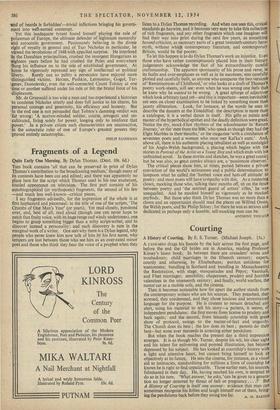Fragments of a Legend
Quite Early One Morning. By Dylan Thomas. (Dent. 10s. 6d.) Tins book contains 'all that can be preserved in print of Dylan 'Thomas's contribution to the broadcasting medium,' though many of its contents have been cut and edited; and there was apparently no place here for the script which Thomas used in his one exuberant, tousled appearance on television. The first part consists of his autobiographical (or mythopoeic) fragments, the second of his few —and much less well-known—critical pieces. I say fragments advisedly, for the impression of the whole is at first haphazard and piecemeal: in the title of one of the scripts, 'The Crumbs of One Man's Year' (or years); Yet read closely, pondered over, and, best of all, read aloud (though one can never hope to catch that fruity voice, with its huge range and windy undertones), one begins to grasp something bigger than a witty script-writer, and to discover instead a personality: and such discovery is rare in the marginal work of a writer. One sees why there is a Dylan legend, why people who never knew him now talk of him b9 his first name, why, tempers are lost between those who see him as an over-rated minor poet and those who think they hear the voice of a prophet when they listen to a Dylan Thomas recording. And when one sees this, critical standards go haywire, and it becomes very easy to take this collection of rich fragments, and any other fragments which one imagines will find their way into print during the next few years, as something beyond criticism, as necessary parts of a great twentieth-century hero' myth, without which contemporary literature, and contemporary Britain, would be the poorer.
To let this happen is to do Dylan Thomas's work an injustice. B en those who have rather contemptuously placed him in their literary judgements acknowledge the fact of his extraordinarily careful craftsmanship. The apparent spontaneity of his prose and verse, in its faults and over-emphases as well as in its successes, was carefully plotted and carefully built, as anyone who compares the two versic of' Reminiscences of Childhood,' or who looks at a draft of Thomas's poetry work-sheets, will see: even when he was wrong one feels tl al he knew why he wanted to be wrong. A great splurge of adjectiveS which look arbitrary (and yet—and this is important—seem inevitable) are seen on closer examination to be linked by something more than jaunty alliteration. Look, for instance, at the words he uses to describe the dancers at the Eisteddfod: the description is more than a catalogue, it is a verbal dance in itself. His gifts as mimic and master of the hyperbolical epithet and the deadly definition were great. Notice the dry, mock-Eliot rhythms of the schoolmaster in 'Return Journey,' or the' men from the BBC who speak as though they had the Elgin Marbles in their mouths,' or the magazine 'with a circulation of seventeen poets and a woman who once met ICafka's aunt.' And, above all, there is his authentic placing (ebullient as well as nostalgic) of his Anglo-Welsh background, a placing which begins with the stories in Portrait of the Artist as a Young Dog and which ends with his unfinished novel. In these stories and sketches, he was a great comic but he was also, as great comics always are, a 'passionate observer.'
The critical pieces show him, at times, poised between a private conviction of the world's seriousness and a public determination to lampoon what he called the 'hushed voice and hats-off attitude' to poetry: and most poets will have sympathy with this. As a roistering clown, mocking those who, talking their mouths off, sit on the fence between 'poetry and the sentinel guard of artists' rifles,' he was unequalled. And he mocked himself as vigorously as he mocked anybody. But those who think Dylan Thomas was no more than a clown and an opportunist should read the pieces on Wilfred Owen, the Welsh poets, and Sir Philip Sidney; for there he was as serious and dedicated as perhaps only a humble, self-mocking man can be.
ANTHONY THWAlla


































 Previous page
Previous page